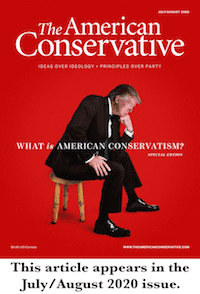Rethinking ‘Zombie Reaganism’ Doesn’t Mean Rejecting Our Best Traditions

The only thing about American conservatism that all self-described conservatives seem to agree on these days is that it is changing. A series of phenomena have jarred the West in quick succession since the last time American conservatives were enduringly unified—the end of the Cold War, the rise of globalism and the Internet, 9/11 and its subsequent wars, the financial collapse and the Great Recession, the Great Awokening among the global elite, the emergence of nationalism on the global Right, and, finally, the COVID-19 pandemic.
Of course, people whose politics are grounded in “the permanent things” will disagree about how to apply time-tested principles to such roiling times. But for all those disagreements, it is only in those permanent principles that conservatives can seek and produce an answer to the question: what is conservatism today?
In one sense, conservatism today is what it’s always been—the political disposition that accepts human nature as fixed and fallen. “If men were angels,” James Madison wrote, “no government would be necessary.” Armed with this deepest of first principles, conservatives advocate a politics which would harness human nature to the common good, rather than pretending to be able to change it.
Thus conservatism today, as always, must be humble, prudent, critical, and realistic. It draws its insights not from fantasies or theories, but the hard-earned lessons of history. It is a kind of marriage between a flinty skepticism about what could be and profound gratitude for what is.
And lest we forget in the heat of this debate, one of the things conservatives in 21st century America should be grateful for is…21st century America! The challenges we face today—as conservatives and as Americans—are challenges born not of failure, but unimaginable success.
The triumvirate of proto-institutions on which the American experiment was launched—our free enterprise economy, voluntary civil society, and our Constitution of limited and separated powers —stand today as inarguable proofs of the Founders’ reading of history: their prioritization of diffuse over centralized power, of cooperative over coerced action, of equal opportunity and the rule of law over equalized outcomes. These seminal national choices—informed the successes and failures of economies, societies, and polities throughout history—made America different. And it’s what made us different that made us great.
What is the difference? Free enterprise, voluntarism, and our Constitution are not just products of trial and error. They are themselves engines of trial and error. At their best, they encourage the production of new ideas, rewarding the good ones and discarding the bad ones. The very fact that the United States stands today as the wealthiest, strongest, and freest nation on earth, and a magazine called The American Conservative is hosting a symposium on how to reimagine the political philosophy that created this world-historical marvel, is just another testament to the system’s underlying virtues.
Yet here we are.
Conservatism does need rethinking, or at least re-applying, because during the last three decades of tumult, the leadership of the Democratic Party has abandoned even tolerating conservatism within its ranks. That has left conservatives with no real political home except the Republican Party, which since the 1980s has simply not had a coherent answer to the social and economic upheaval we have endured since the Berlin Wall came down.
Conservatives, under the GOP, had a unifying answer to communism. It still doesn’t have a unifying answer to globalism, or its ripple effects of populism and nationalism on the Right and woke-ism on the Left. President Trump won the Republican presidential nomination and the White House indicting this failure—but three years into his presidency, congressional Republicans are more comfortable imitating his brash style than grappling with his substantive critiques of their leadership.
To their credit, many conservatives have answered the president’s challenge to offer a conservatism relevant to the challenges we face. The Republican Party of George W. Bush and Mitt Romney—operationally for open borders and reflexive free trade, unquestioningly interventionist in foreign policy, and obsequious to the corporate aristocracy of Wall Street and Silicon Valley—is gone. And thank goodness.
But for all the shock and awe of Trump’s 2016 victory, the defeat of the “Zombie Reaganism” GOP was less a coup than a reality check. That GOP coalition and agenda was built in and for another time, and it worked! Republican candidates won the popular votes in five of the six presidential elections leading up to the fall of the Berlin Wall. They have won the popular vote only once in the seven elections since—2004, when terrorism and national security temporarily defined our politics. The GOP, as an institution, and conservatism, as a movement, simply have not done the work necessary to rebuild either a winning agenda or a winning coalition.
A new generation of conservative thinkers, writers, publications, and politicians have leapt into this vacuum, and the scrum will no doubt continue until at least 2024, when the GOP picks Donald Trump’s successor as standard bearer. It’s an exciting time, and indeed, the suddenly open Overton Window is letting in a lot of badly needed fresh air. It’s long past time for conservatism to answer the challenges of the 21st century—but that answer must still be conservative.
In this era when low-skilled workers’ wages are not keeping up with everyone else’s, it makes a lot of sense to reduce or, if necessary, shut down low-wage immigration. Given what we know about China, six months into our Wuhan flu nightmare and twenty years after inviting them into the global economic market, our stance, including our trade policies, must be reformed. Given what we know about the Pentagon and our intelligence agencies, and their abject failure two decades into the War on Terror, our entire national security strategy must be rethought. Given what we know about the power tech companies are wielding over our lives, a new approach to antitrust law that focuses not only on prices but also on corporate power makes sense. Look at our creaking, broken-down welfare system, the woke, union-controlled K-12 education system, or hollowed out manufacturing base: there is a lot of room for modernization.
There will be drawbacks to making these changes—tradeoffs. But it’s long past time we had those debates.
On the other hand, just because libertarians are out of favor does not suddenly mean free markets don’t work. Just because civil society has been hamstrung by government encroachment does not suddenly mean welfare programs are more effective problem solvers than local churches, charities, and volunteers. Just because constitutional “textualism” and “originalism” have not slayed the dragon of secularism and political correctness does not mean conservatives must jettison the rule of law and put our thumb on the scales of justice for a change.
Objections to “conservative industrial policy” —if by that term we mean “statism with pro-life staffers”—and “beyond originalism”—if by that we mean daily communicant judges substituting their values for the written law—are not abstract or ideological. They’re based on ironclad lessons of history and laws of human nature. Centralized power is still as vulnerable to corruption—and imbecility—and as much of a threat to human flourishing as it has ever been.
Free enterprise, voluntary association, and the United States Constitution are still Americans’ best chance of success. Not because Milton Friedman or The American Enterprise Institute said so, but because Americans for two centuries and human beings for five millennia have tried to improve on them… and haven’t yet.
Rachel Bovard is the senior director of policy at the Conservative Partnership Institute.
Related: Introducing the TAC Symposium: What Is American Conservatism?
See all the articles published in the symposium, here.
Comments